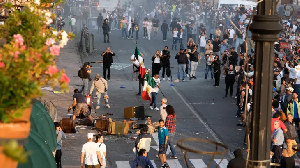Koforidua, April 8, GNA - The Ministry for Women and Children's Affairs (MOWAC), in collaboration with International Organization For Migration (IOM), is taking steps to reduce human trafficking by supporting parents, guardians and fishermen to engage in sustainable livelihoods that do not involve child labour.
Mrs Juliana Azumah, Minister for MOWAC, said this in an address read on her behalf at the close of a three-day capacity-building training workshop in Koforidua for law enforcement officials and prosecutors. The workshop was aimed at improving the skills of the participants in detection of human trafficking cases, ways to exchange and analyze operational data among themselves to enable them arrest and prosecute offenders.
Twenty-five participants drawn from the Navy, Police, Immigration and the Customs Excise and Preventive Service (CEPS) attended the workshop that was organized by the MOWAC and IOM and sponsored by the Royal Danish Embassy.
Mrs Azumah said human trafficking is a complex form of modern day slavery and rated among the third most lucrative illegal trade globally, affecting the most vulnerable, particularly women and children. "Traffickers prey primarily on the most vulnerable-women, children, the poorest, the least educated and the innocent in our country". She said human trafficking was usually part of organized criminal activities involving drug trafficking, child prostitution, forced or compulsory labour, sexual assault, rape among many others. Mrs Azumah said Ghana was considered as one of the "sending" and "receiving" countries in the sub-region and locally. "We have experienced various incidences of irregular migration and trafficking in persons especially in the commercial, fishing and agricultural sectors".
"Much concern has also been shown about the manner women and children migrate from the north to the south to seek non-existing jobs and end up living under very dangerous conditions in the streets of the cities and some children are even trafficked in the process to our neighbouring countries and abroad".
She said she was optimistic that with the legal framework and policies in place, focal institutions tasked under the Human Trafficking Act, 2005, (ACT 694) would be actively involved in the implementation process. Mrs Dyane Epstein, Chief of Mission, IOM-Ghana said the abuse, exploitation and violence visited upon so many trafficking victims was an indignity and shame.
Regional News of Thursday, 8 April 2010
Source: GNA












